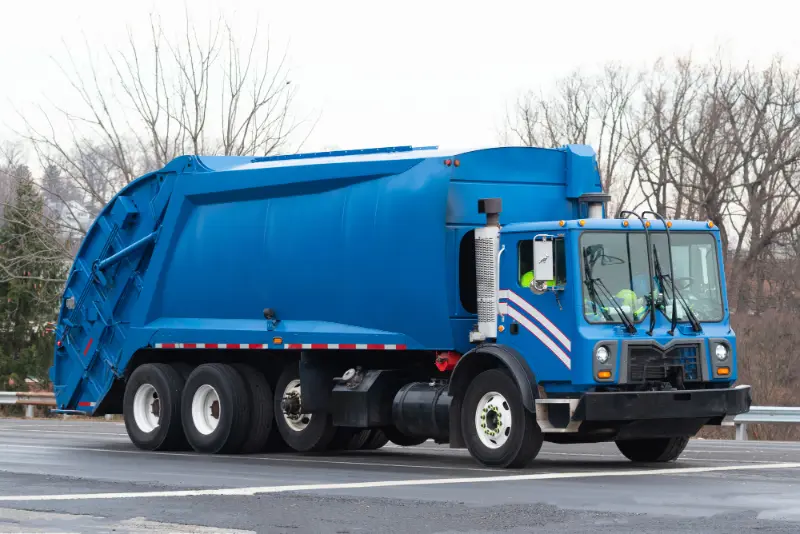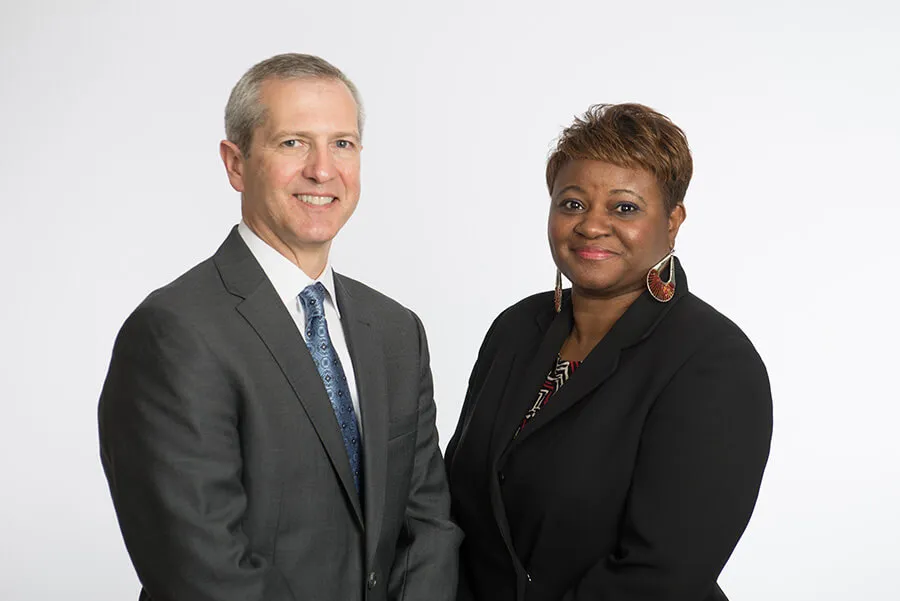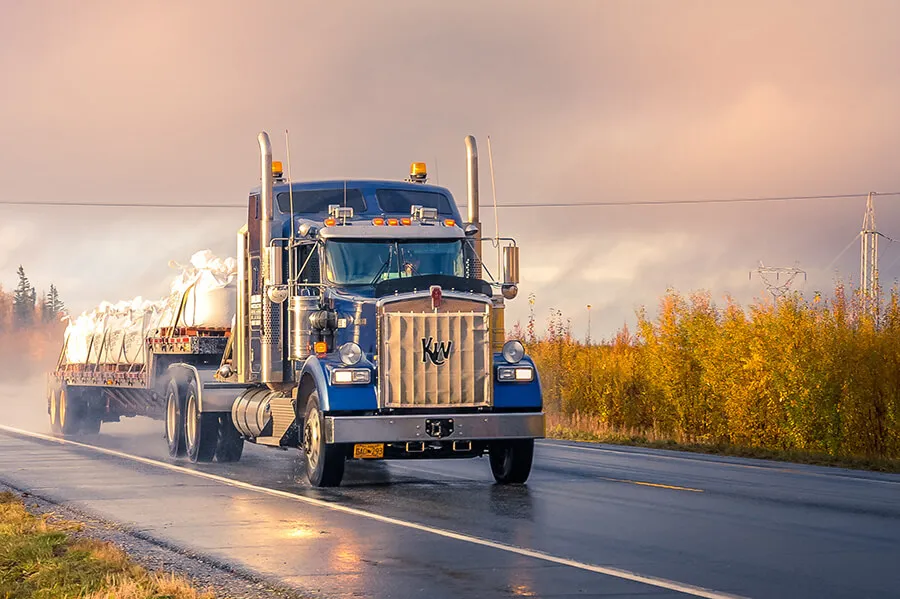Atlanta Garbage Truck Accident Lawyer
Have you noticed your trash pickup services in Atlanta getting slower and slower? If so, then you’re far from alone. In fact, the city of Atlanta spent over $12 million back in March of 2023 attempting to secure emergency contracts to pick up trash.
According to reports, almost one in four garbage pickup employees was absent every day in mid-2023, causing severe delays and pickup problems.
This pressure on trash pickup services has led to more garbage truck accidents* (page 37 in the latest available Atlanta’s Department of Public Works report).
If you experience an accident with a sanitation truck in Atlanta, then it’s important for you to quickly get informed about your legal options and rights. Typically, your best option is to consult one-on-one with a garbage truck accident lawyer about what happened, but below, we’ll go over some general things you should know about your accident and how to handle it.

Why Garbage Truck Accidents Occur in Atlanta
Did you just recently witness a garbage truck accident? These types of collisions are far more common than you might think, especially in these past few years as sanitation collections in Atlanta have been struggling to maintain operations. With fewer employees, outdated equipment, and increasing demand, more garbage truck drivers are experiencing fatigue.
Fatigued driving can quickly lead to an accident. Drowsiness impacts reaction times and judgment. While driving a garbage truck, fatigue can cause a driver to make a mistake, swerve out of their lane, or even hit another car.
Distracted driving is another common cause of these accidents. When drivers aren’t paying attention to the road even for a second or two, a collision can occur. Drivers who are intoxicated by drugs are alcohol are also more likely to cause an accident.
Reckless driving maneuvers, like failing to adhere to traffic laws, speeding, or tailgating, can also cause an accident. Be vigilant when you see a garbage truck in operation. Don’t try to tailgate them or get them to move faster. When possible, simply pass the garbage truck instead of getting frustrated.
Another common cause of garbage truck accidents is blind spots. Garbage trucks are bigger, which means they’re not as equipped to see vehicles that are close behind them or sometimes in a parallel lane. In general, if you can’t see the garbage truck driver’s side mirror, then they can’t see your car, either.
A few other common causes of accidents include bad weather, poorly maintained garbage trucks, or defective car parts.
Determining Who Was at Fault
After your accident, figuring out who or what caused your crash is crucial to determining how to handle it. Georgia operates on an at-fault basis, which means the party that’s considered at fault for the accident will also be held financially responsible for the losses.
After your crash, the responding police will begin an initial investigation into what happened. If they don’t determine who was at fault in the initial investigation, then you may have to dig deeper and start to collect evidence on your own. You can search for evidence like nearby surveillance footage, dash cam videos, photographic evidence, or conduct an accident scene reconstruction investigation.
If you’re not sure how to get started on investigating what happened, then get in touch with garbage truck accident lawyers who can help you figure out who was at fault and who might be liable for your crash.
Types of Garbage Trucks in Atlanta
In general, there are four major types of garbage trucks: front loaders, side loaders, rear loaders, and roll off trucks.
Front loaders
Front-load trucks, also known as front-end loaders or front loaders have a few key characteristics:
- They have large forked arms on the front that lift and empty large waste containers. The containers, often called dumpsters, slide directly onto the arms from the front, giving them their name “front-loaders.”
- The lifting mechanism and container holder are mounted on the front of the truck chassis rather than the side or back like on some other types of garbage trucks.
- They are very common in suburban and urban residential areas as well as for commercial waste collection. Front-load trucks can efficiently service containers left outside at businesses, apartment buildings, shopping centers, etc.
- They are designed to service large standardized metal containers ranging from 1 to 8+ yards in capacity. The trucks use hydraulic power to lift the bins and dump their contents into the truck’s main storage bay or hopper.
- Front-load trucks allow waste collection with fewer staff because the standardized containers can be picked up mechanically rather manually. This makes them popular in areas with high labor costs.
Side loaders
Side loaders usually pick up household waste and can be either automated or manually loaded. Manually loaded garbage trucks require the truck to stop, pull over, and have workers manually dump the household trash into the truck. Some key facts about them:
- As the name suggests, side loaders have an automated lift arm mounted on the side rather than the front. This arm grasps residential wheelie bins and dumps the contents into the truck’s main body.
- They are designed for efficient curbside collection in suburban neighborhoods, particularly in areas with smaller roads or alleyways that may be hard for front-loading trucks to maneuver.
- The lifting mechanism allows one operator to drive the truck while the automated arm grabs and empties bins into the side of the truck. This reduces staffing needs compared to rear-loading trucks that require two or more people.
- Side loaders may have multiple arms so they can pick up trash and recycling bins on both the left and right side of the street, reducing trips up and down the road.
- Residents are provided standardized wheelie carts sized specifically for the reach and grasp capabilities of the side loader. The Republic Services side loaders operating in Atlanta are optimized for 95-gallon trash carts.
Rear loaders
- Rear loaders are the more common type of garbage truck in Atlanta. This is because rear loaders are better suited for collecting garbage from alleyways and narrow streets, which are common in Atlanta.
- Rear loaders have a hydraulic lifting mechanism in the back of the truck rather than the side or front. Workers manually roll carts onto the lift, raising and emptying them into the truck.
- Rear loading requires more labor to operate – normally a crew of 1 to 2 workers doing the manual rolling and emptying of bins vs automated side-load arms.
Roll off trucks
Roll off trucks are best for picking up mass-scale commercial waste.
- Roll-offs are designed to haul and transport very large open top rectangular waste containers called roll-off containers or dumpsters.
- Sizes typically range from 10 to 40+ cubic yards, much bigger than curbside bins. Some have lids, though many are open.
If you’re not sure what type of truck you got into an accident with, then a garbage truck accident attorney can help you identify what it was.
How to Know Who’s Liable for a Garbage Truck Accident
Were you involved in a garbage truck accident yesterday? You will be able to know who is financially liable based on what caused the crash and who had a legal duty to prevent the crash. While the garbage truck driver could be liable, the company who hired the driver could also be the party liable depending on the situation of the crash.
If your accident involved a major company like UPS, Amazon, or DHL, then hire a specialist legal representative, like a DHL truck accident lawyer to help. They’ll have experience going over the company’s contracts and legal terms when it comes to liability issues.
Your Garbage Truck Accident Compensation Options
A garbage truck accident lawyer can help you determine your options for compensation after a collision. In general, a claim is designed to help restore you to the financial position you were in prior to your accident. A claim typically won’t give you more money than you’ve lost, but it will help you pay off expenses you acquired due to your accident or injury. Below, we’ll go over some of the most common damages awarded in these types of accidents.
Medical Bills
A sanitation truck accident can leave you with significant injuries. When you receive treatment for those injuries, you’ll incur medical bills. Save any medical bills and diagnosis reports you receive, as you can seek out compensation for all the medical bills you acquire as a result of a crash that was someone else’s fault.
Lost Wages
Your injuries might also prevent you from being able to return to work right away. Speak with your employer about writing you a letter that states how much you earn on average and how much time you’ve missed out on at work. The right garbage truck accident lawyer will help you file compensation for the lost income you would’ve earned if you never got hurt.
Property Damage
Are you frantically Googling phrases like, “A garbage truck hit my car. What do I do?” If so, then don’t fret. The property damage you experience to your vehicle is recoverable through a personal injury lawsuit when the accident was someone else’s fault.
Accidents with garbage pickup vehicles, semi trucks, and other large vehicles can leave your car completely totaled. Be sure to contact a semi truck accident lawyer, garbage truck lawyer, or an attorney who is equipped to handle major losses if you experience massive property damage after your crash.
Wrongful Death Damages
Sadly, accidents can result in fatal injuries. When a life is lost, the surviving loved ones can seek out compensation in the form of wrongful death damages when the accident was someone else’s fault. These damages will cover losses like funeral expenses, burial costs, pain and suffering, a loss of financial support, and more.
How to Get Started on a Claim
Do you believe that your recent garbage truck accident was someone else’s fault? Are your losses adding up? If so, then your best bet is to get in touch with an Atlanta trucking accident lawyer who can help you with your next steps on getting started on your claim. First, you’ll want to analyze your losses and start collecting all the documentation and evidence you’ll need to prove your claims. From there, you’ll need to file the right paperwork to initiate a claim against the responsible party. Once that party is alerted about the situation, the negotiation process will begin. If you can’t work out a settlement, then your case may wind up in court.
Talk to an Atlanta Garbage Truck Accident Lawyer for Free Today
Have you experienced a garbage truck accident in Atlanta recently? Do you believe the accident was caused by the garbage truck driver’s error or the garbage truck company’s negligence? If so, then you need to get the authorities involved. The police will start an initial investigation into what happened while you focus on your physical recovery. In the coming days, you can get more details on what caused the accident, who might be liable, and the extent of your losses.
When your losses are significant, it makes the most sense to contact a garbage truck accident lawyer. An attorney can go over the specific details of your accident with you and learn more about your losses to help you determine your legal options and the best path forward. Depending on what happened, you may be eligible to file a claim for compensation from the responsible party.
Are you ready to get started? Schedule a meeting with our firm now to talk about your accident in more detail with our firm.
Our Practice Areas
Car accident attorney
Atlanta automobile accidents attorney with over 30 years of experience. Contact us and we will find the best way out for you!
Personal Injury attorney
Atlanta personal injury attorney who fights aggressively to obtain 100% of the compensation available under the law. Get a free quote.
Truck accident attorney
Did you get involved in a truck accident in Georgia? Contact our Atlanta trucking accident attorney – we can help you with your case.


